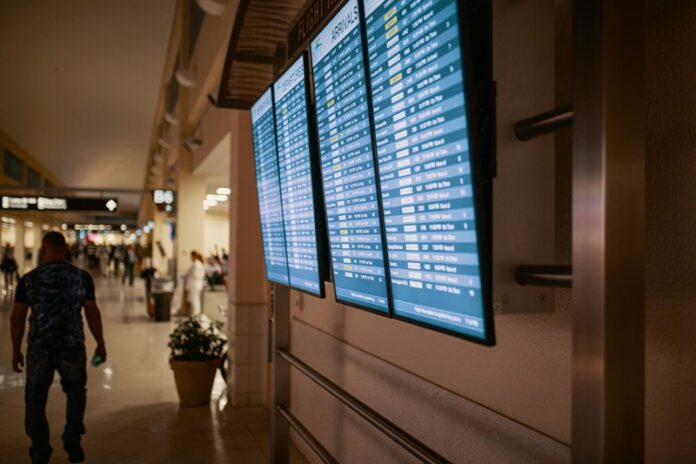Few things put a damper on travel plans like a delayed or cancelled flight. While some travel hiccups are unavoidable, savvy planning can help reduce the chances of disruption and minimise your chances of ending up stuck at the airport.
Here’s how to stack the odds in your favour when booking your next flight.
Preparing to book your flight
#Tip 1: Don’t book the last flight of the day
Lynette Machiri, Customer Experience Leader at Flight Centre South Africa, highlights one golden rule: “If you’re able to avoid it, never book the last flight of the day.” While late-night flights might seem convenient after a long day of sightseeing, there’s less margin for error.
“If a flight is delayed or cancelled after-hours, you’ll find yourself with fewer options to rebook the same day,” Machiri advises.
Earlier flights offer more flexibility should anything go wrong, with plenty of connections and alternative flights during the day.
#Tip 2: Direct is best
While often pricier, non-stop flights should always be your first choice if you’re aiming to reduce risk.
“Transit points increase the chance of something going wrong,” Machiri points out.
Layovers open the door to delayed connecting flights or even misplaced luggage. When possible, pay a bit more upfront for a direct connection – you might just thank yourself later.
“One way to avoid any delays due to layovers (but still benefit from the non-direct airfare) is to opt for a stopover. If your layover is long enough (visa requirements permitting), layovers with a stopover can be a great way to maximise travel over the peak season, explore an extra destination and ‘avoid’ the long layovers stuck at the airport,” says Machiri.
#Tip 3: Research your route and airline
Some routes and airlines consistently perform better than others for on-time arrivals. Knowing your airline’s on-time performance record can be a game changer.
“Some airlines have a better track record with punctuality than others,” Machiri says.
Before booking, she suggests:
- Check if your chosen route is prone to weather-related delays
- Research airline performance records
- Consider the reputation of both the carrier and the airports you’ll use
Websites like FlightStats or Skytrax make it easier to assess various airlines’ reliability. A little extra research upfront can help cut down the frustration later. Machiri advises speaking to a travel expert for recommendations.
#Tip 4: Book for off-peak
“Flight delays are more likely during peak travel times,” says Antoinette Turner, General Manager of Flight Centre South Africa. “Avoid major holidays or school holidays when airports are stretched to full capacity and more prone to back-ups.”
While many travellers might not have the flexibility to skip busy seasons entirely, booking flights outside rush-hour windows – typically the late afternoons – can help you avoid the worst delays.
Data from the U.S. Bureau of Transportation Statistics (BTS) and various airline punctuality studies have shown that earlier flights (mainly those in the morning, including mid-morning) tend to be more on time compared to afternoon and evening flights. This is because delays from earlier flights tend to accumulate throughout the day, causing later departures to be impacted.
#Tip 5: Insurance is your best friend
Even the best-laid plans can hit a snag. That’s where travel insurance comes in. If you haven’t invested in decent coverage, you could be left in the lurch when you least expect it.
“Be sure your travel insurance covers you for unexpected delays or cancellations,” suggests Turner.
Although travel insurance can’t prevent a disruption, it can at least cushion the financial blow.
“Many travellers mistakenly think their credit card or medical aid covers everything, but free cover is often limited,” she adds. “We recommend Travel Insurance Consultants (TIC) to ensure you are adequately covered – whether you’re looking for comprehensive leisure insurance, business cover, local insurance or a sports inclusion. A Flight Centre Travel Expert can assist you with this when booking.”
#Tip 7: Timing is everything
Timing is key when booking flights.
“There’s a sweet spot,” Machiri says. “Booking too far in advance may leave you overpaying, while waiting until the last-minute puts you at the mercy of higher prices and limited choices.”
She advises getting your domestic flights booked around six months ahead and international flights up to 12 months if possible. Planning early also allows you to get your preferred seating (you may have to pay extra for this, depending on your chosen seat or airline) – which, for some, could mean getting closer to the front of the plane for a quicker exit and smoother transit.
# Tip 8: Be flexible
Flexibility is your ultimate travel ally. Even if you’ve booked a non-stop, perfectly timed flight with a highly-rated airline, being adaptable with your travel dates increases your chances of a smooth trip. Avoid travelling when flight schedules are tight or give yourself extra time to make that connection. Plus, flexible travellers may also benefit from lower fares.
#Tip 9: Verify entry and identification requirements
“We urge all our customers to properly confirm visa guidelines and check that passports and other required documentation are valid well beforehand,” says Turner. “Entry requirements frequently change, so it’s crucial to recheck as your departure date approaches.”
#Tip 10: Work with reputable travel experts
Having knowledgeable support can make all the difference when plans go awry. “A travel expert can help you navigate disruptions, find alternative options, and provide guidance every step of the way,” says Turner.
Book with ASATA accredited members, who adhere to a Code of Conduct and Constitution, to avoid falling victim to possible scams or fly by night operations. ASATA represents, vets and promotes professional service in the travel industry. More than 95% of South Africa’s travel industry belongs to ASATA.
Getting ready to depart
#Tip 11: Pack smart
One of the simplest tips often overlooked is travelling with the essentials in your carry-on. “Important medications, electronics, and even a change of clothes should always be alongside you. If your flight is delayed or your checked-in luggage doesn’t arrive with you, you’ll be thankful for your hand luggage,” notes Turner.
#Tip 12: Stay in the know
Download your airline’s app for real-time updates and ensure your contact details are current when booking. This helps airlines reach you quickly if there are schedule changes.
Stay informed about the latest travel advisories for destinations also.
The bottom line
Although no travel plan is guaranteed to run perfectly, with the right know-how and a little planning, you can cut out many of the potential pitfalls, giving yourself the best possible chance of a seamless journey.
As Turner aptly puts it, “Planning ahead doesn’t just minimise delays. It maximises the fun you’ll have when you get there.”
Article Provided




























